Instituto Nacional de Investigación Agropecuaria
Ramularia leaf spot management alternatives in barley optimizing the use of fungicides for its control: Doctoral thesis abstract. [Alternativas de manejo de ramulariosis en cebada optimizando el uso de fungicidas para su control: Resumen de tesis doctoral.].
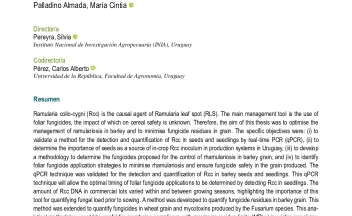
ABSTRACT.- Ramularia collo-cygni (Rcc) is the causal agent of Ramularia leaf spot (RLS). The main management tool is the use of foliar fungicides, the impact of which on cereal safety is unknown. Therefore, the aim of this thesis was to optimise the management of ramulariosis in barley and to minimise fungicide residues in grain. -- RESUMEN.- Ramularia collo-cygni (Rcc) es el agente causal de ramulariosis. La principal medida para su manejo es la utilización de fungicidas foliares cuyo impacto en la inocuidad del grano es desconocido.
Relationship between grass height, grazing management and avifauna in livestock systems in the eastern region of Uruguay: Doctoral thesis abstract. [Relación entre la altura del pastizal, manejo del pastoreo y la avifauna en sistemas ganaderos de la región este de Uruguay: Resumen de tesis doctoral.]
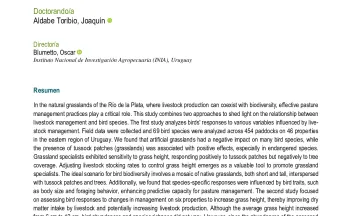
ABSTRACT.- In the natural grasslands of the Río de la Plata, where livestock production can coexist with biodiversity, effective pasture management practices play a critical role. This study combines two approaches to shed light on the relationship between livestock management and bird species. ------- RESUMEN.- En los pastizales naturales del Río de la Plata, donde la producción ganadera puede coexistir con la biodiversidad, las prácticas efectivas de manejo de pastizales desempeñan un papel crítico.
Olive-tree physiological response to biotic and abiotic stress fruit yield, oil quality and tolerance to Anthracnose:Doctoral thesis abstract. [Respuesta fisiológica del olivo a estrés biótico y abiótico: rendimiento, calidad del aceite y tolerancia a antracnosis:Resumen de tesis doctoral.].
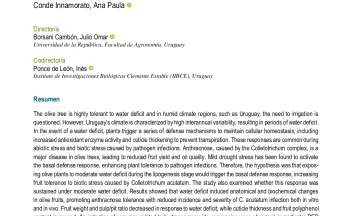
ABSTRACT.- The olive tree is highly tolerant to water deficit and in humid climate regions, such as Uruguay, the need to irrigation is questioned. However, Uruguay's climate is characterized by high interannual variability, resulting in periods of water deficit. In the event of a water deficit, plants trigger a series of defense mechanisms to maintain cellular homeostasis, including increased antioxidant enzyme activity and cuticle thickening to prevent transpiration.
Privatización de la tierra y pérdida de bosques nativos en el Chaco Seco. [poster].
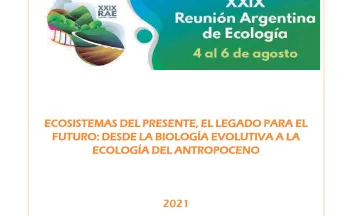
Conocer la relación entre la tenencia de la tierra y la superficie de bosques resulta clave para definir acciones de conservación frente al avance de las fronteras agropecuarias.
Degradación de las interacciones micorrícicas en pastizales como mecanismo de invasión de Cynodon dactylon. [resumen]
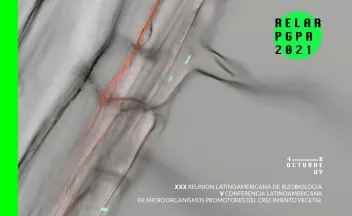
En Uruguay el campo natural (CN) representa el sustento de la ganadería extensiva. Entre las prácticas de intensificación productiva, se encuentran los mejoramientos extensivos (CNM; fertilización con fósforo y siembra de leguminosas) para incrementar la calidad de forraje. E
Exploring the seroprevalence and molecular epidemiology of Toxoplasma gondii in sheep populations of Uruguay. P018. [Poster presentation].

Toxoplasmosis poses a substantial risk as a globally prevalent foodborne zoonotic disease. This disease does not only impact public health, but also results in noteworthy economic losses for countries dependent on rural activities, particularly those associated to the livestock industry, particularly pronounced in sheep and goats, where reproductive failure is a prevailing consequence. With a history deeply rooted in sheep farming, Uruguay ranks as the fifth-largest global exporter of sheep meat and the third-largest exporter of combed wool.
El microbioma agrícola. [coordinadores Sesión trabajo 1].
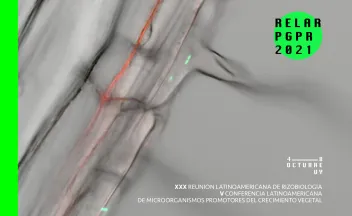
La agricultura moderna convencional ha experimentado procesos de intensificación y especialización asociados a un aumento del uso de energía fósil por el incremento en el uso de agroquímicos, mecanización y riego. El microbioma agrícola es clave en la transición hacia sistemas agrícolas sostenibles. En esta sección se presentarán algunos avances de la comunidad científica en el estudio y comprensión del microbioma agrícola.
Soil conservation measures affect the soil and Rhizosphere microbiota and improve soil health in vegetable and grain crop systems in Uruguay. [resumen]
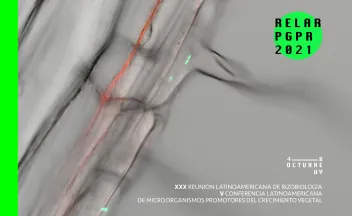
Currently, is still unclear how agriculture intensification changes the soil microbiome and soil properties with implications for plant performance. Two Uruguayan long-term field experiments (LTEs) were studied, where we measured soil physicochemical properties, plant performance and soil and rhizosphere microbiota, by high-throughput amplicon sequencing.
Promoción indirecta del crecimiento vegetal. [coordinadores Sesión 2]
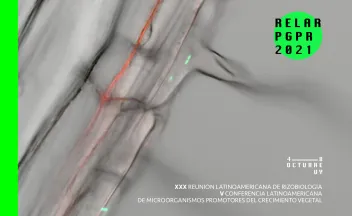
Una fracción sustantiva de la diversidad microbiana está íntimamente asociada a distintos órganos o compartimentos vegetales y contribuyen significativamente al crecimiento saludable de la planta por medio de mecanismos que reducen el impacto negativo de fitopatógenos.
Paginación
- Página anterior
- Página 17
- Siguiente página

